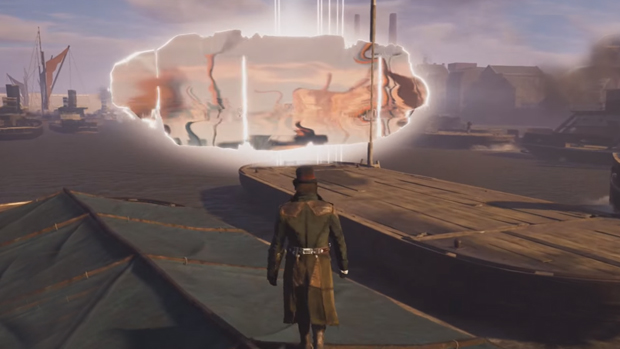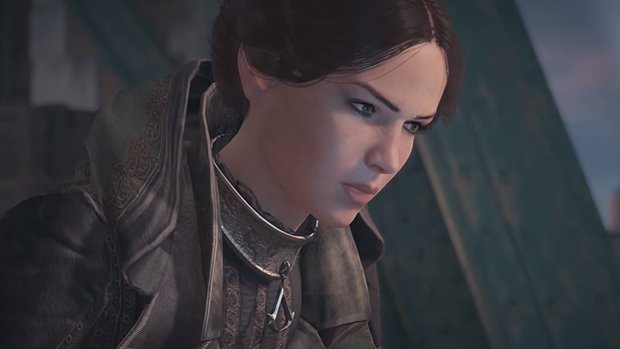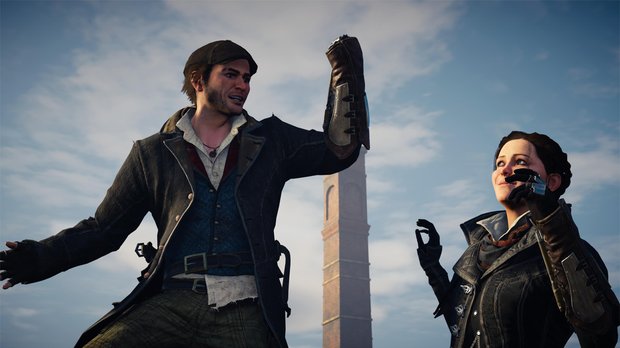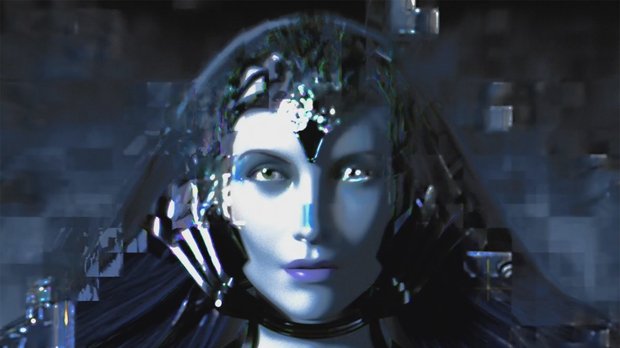Why I Love: Assassin's Creed Syndicate's mystery portal
WARNING: Spoilers for Assassin's Creed Syndicate throughout. Also Unity. Really, Assassin's Creed 3 onward.
Search hard enough in Assassin's Creed Syndicate (or just track down the right menu marker), and you'll be launched, hood over heels, through a virtual reality portal that drops you in a completely different time in London's history. It's nearly identical to the portals that appear in Assassin's Creed Unity, pulling you out of revolutionary Paris and setting you loose within view of an in-progress Statue of Liberty, or in the midst of a World War II air raid. These segments in Unity make decent enough distractions - it's fun parkouring up the Eiffel Tower and sneak-attacking Nazis - but they're ultimately cosmetic additions that have no impact on the overall game and can easily be skipped without missing anything of value.

You'd think the portal in Syndicate wouldn't be much more enthralling, since the concept is the same and history tends to repeat itself. However, just as the rest of the game makes noticeable and widely felt improvements through thoughtful tweaks, this mystery portal suddenly become not just vaguely amusing, but an important part of the game that actively affects the rest of the story. On top of that, it single-handedly drags a forgotten aspect of Assassin's Creed's overarching plot back into existence, integrating it so well it's as if it was never in danger of being forgotten. That kind of thoughtfulness proves that the even the series' most convoluted concepts can still work together smoothly, if they're treated with care and attention.
When you first enter the mystery portal at the far-east cut-off of the River Thames, it's immediately clear that something here is different than before - rather than an anonymous narrator urging you to make a break for the gateway or risk being killed by convoluted pseudoscience, you're called over by an ethereal voice that instantly grabs your attention. If you're an Assassin's Creed fan, this is a voice you've heard before, and you know it means bad news - it belongs to Juno, the mystical being who has been manipulating all the events of the series from behind the scenes, only to seemingly vanish after Assassin's Creed Black Flag. Instantly, the mystery portal is far more intriguing, because it's now connected to an overarching plot and has internal relevance, giving you a reason other than simple curiosity to care about what's on the other side.

What you find there doesn't disappoint: reappearing in a secret German safehouse in the midst of World War I, you're quickly put to the task of uprooting enemy spies hiding in London and sniffing out their leader. Not particularly complicated, but Syndicate gives the section weight by imbuing you with a specific identity - rather than being Faceless Assassin #23 scouring the Helix servers as you are in Unity's portals, you step into the boots of Lydia Frye, granddaughter to Jacob Frye and temporary agent of Winston Churchill.
Where the series as a whole has struggled in recent years to instill a true sense of legacy into its story, spinning its wheels as it jumps from one unrelated protagonist to the next, Syndicate makes it look easy - integrating it into every piece of the storyline, Syndicate specifically takes the time to address how it could work in this part of the game too, instead of writing it off as a superfluous side mode. Not only does that give us a new character to learn about (and Lydia is a fully realized person, a studious Assassin who trained under the illustrious Frye twins and became a critical defense force for London while her husband headed to the front lines) but helps us understand Jacob and Evie a little bit better too. The fact that Jacob settles down enough to have a family and the twins continue to train young Assassins into their old age are things we never would have known otherwise, and that gives them an extra dimension that only makes them more appealing.

But perhaps the most important thing the mystery portal does for Assassin's Creed as a whole is reinvigorating an ailing part of the modern-day story in a way that feels natural. As those who've played Black Flag might remember, over the course of that game you're introduced to the Sages, reincarnations of Juno's beloved husband Aita born throughout history. Once her soul is freed from everlasting imprisonment by Desmond in Assassin's Creed 3, Juno loads herself onto the internet in place of a physical body (yes, I hear myself) and seeks out a present-day Sage named John Standish (you might remember him as 'John the IT guy') to help her begin preparations for enslaving the human race. Which, hey, is pretty damn fascinating. Tell me more.
Sign up to the GamesRadar+ Newsletter
Weekly digests, tales from the communities you love, and more
Unfortunately, this plot isn't mentioned at all in either Unity or Rogue, making it seem as though the idea had been abandoned in favor of making Assassin's Creed games forever without the inconvenience of maintaining continuity. Sad, since the modern-day storyline is the glue that holds Assassin's Creed together.

Syndicate, however, puts more value on that overarching tale, and brings it back to life with a deft understanding of what makes a game work. Eventually, you realize you've been called to this rift in time because the leader of the German spies is a Sage, and Juno wants to know his fate so she can figure out what the Sages have been up to for the last several millennia; as a spirit integrated into the computer networks of the world, she's able to press you into service while she watches from within. Bizarre pseudoscience though it may be, it all works together brilliantly. The creators of Syndicate clearly value both the fun of the portal segments and the intrigue of the modern-day story, and in allowing them to complement each other, it makes both feel worthwhile in a way they haven't for years, if ever.
Former Associate Editor at GamesRadar, Ashley is now Lead Writer at Respawn working on Apex Legends. She's a lover of FPS titles, horror games, and stealth games. If you can see her, you're already dead.



